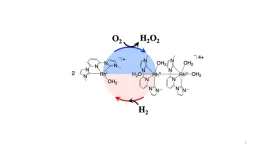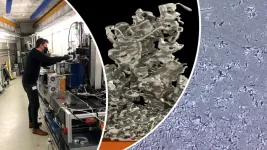(Press-News.org) Both conservative and liberal Americans share fake news because they don’t want to be ostracized from their social circles, according to research published by the American Psychological Association.
“Conformity and social pressure are key motivators of the spread of fake news,” said lead researcher Matthew Asher Lawson, PhD, an assistant professor of decision sciences at INSEAD, a business school in France. “If someone in your online tribe is sharing fake news, then you feel pressure to share it as well, even if you don’t know whether it’s false or true.”
The research was published in the Journal of Experimental Psychology: General.
The proliferation of fake news contributes to increasing political polarization and distrust of democratic institutions, according to the Brookings Institution. But fake news doesn’t always proliferate due to dark motives or a call for action. The researchers began studying the issue after noticing people in their own social networks sharing fake news seemingly without malicious intent or ideological purpose.
“Political ideology alone doesn’t explain people’s tendency to share fake news within their social groups,” Lawson said. “There are many factors at play, including the very basic desire to fit in and not to be excluded.”
One experiment analyzed the tweets and political ideology of more than 50,000 pairs of Twitter users in the U.S., including tweets sharing fake or hyper-partisan news between August and December 2020. (Political ideology was determined through a network-based algorithm that imputes ideology by looking at the types of accounts Twitter users follow.) The number of tweets between pairs of Twitter users in the same social circles were measured. Twitter users were less likely to interact with each other over time if one of them shared a fake news story and the other did not share that same story. The same effect was found regardless of political ideology but was stronger for more right-leaning participants.
A second experiment analyzed 10,000 Twitter users who had shared fake news in the prior test, along with another group that was representative of Twitter users in general. Twitter users who had shared fake news were more likely to exclude other users who didn’t share the same content, suggesting that social pressures may be particularly acute in the fake news ecosystem.
Across several additional online experiments, participants indicated a reduced desire to interact with social connections who failed to share the same fake news. Participants who were more concerned about the social costs of not fitting in were also more likely to share fake news.
While fake news may seem prolific, prior research has found that fake news only accounts for 0.15% of Americans’ daily media consumption, and 1% of individuals are responsible for 80% of fake news sharing. Other research found that election-related misinformation on Twitter decreased by 73% after Donald Trump was banned from the platform.
Many complex factors contribute to people’s decisions to share fake news so reducing its spread is difficult, and the role of social media companies isn’t always clear, Lawson said.
“Pre-bunking” methods that inform people about the ways that misinformation spreads and highlighting the importance of the accuracy of news can help reduce the spread of fake news. However, finding ways to ease the social pressure to conform in online spaces may be needed to start winning the war on misinformation, Lawson said.
Article: “Tribalism and Tribulations: The Social Costs of Not Sharing Fake News,” Matthew Asher Lawson, PhD, INSEAD, Shikhar Anand, Indian Institute of Technology Delhi, and Hemant Kakkar, PhD, Duke University, Journal of Experimental Psychology: General, published online March 9, 2023.
Contact: Matthew Asher Lawson, PhD, may be contacted at asher.lawson@insead.edu.
END
Americans share fake news to fit in with social circles
Fear of exclusion contributes to spread of fake news, research finds
2023-03-09
ELSE PRESS RELEASES FROM THIS DATE:
A safe synthesis of hydrogen peroxide inspired by nature
2023-03-09
Fukuoka, Japan—Hydrogen peroxide is a ubiquitous chemical found in most homes and used in everything from dying hair to treating wounds. It is also an invaluable agent for many industries from food, textiles, and even in semiconductor production.
Reporting in JACS, researchers at Kyushu University have developed a new process to synthesize this chemical utilizing a new homogeneous catalyst inspired by nature. Moreover, the process is significantly safer than conventional methods.
Scientists have been reporting the synthesis ...
A novel mechanism may be effective in patients with severe hypertriglyceridemia and prior episodes of acute pancreatitis
2023-03-09
A novel type of therapy, known as ANGPTL3 inhibitor therapy, was effective in lowering triglycerides in certain types of patients with severe hypertriglyceridemia (sHTG) who had a prior episode(s) of acute pancreatitis. sHTG is a well-established risk factor for recurrent episodes of acute pancreatitis. These high-risk patients were the focus of a phase 2 study that was led by the Icahn School of Medicine at Mount Sinai and sponsored and funded by Regeneron.
This ANGPTL3 inhibitor therapy, the intravenous drug evicanumab-dgnb, inhibits two important regulators of lipoprotein metabolism. ...
Researchers unveil smart contact lens, capable of implementing AR-based navigation
2023-03-09
With the advent of the Metaverse era, there have been growing expectations that virtual reality (VR) and augmented reality (AR) technologies will likely to enhance convenience in everyday life, as well as industry productivity performance.
A joint research team, affiliated with UNIST has introduced core technology for smart contact lenses that can implement AR-based navigation through a 3D printing process. According to the research team, the new smart contact lenses can be worn inside the eye of a person, like a normal contact lens.
Published in the February 2023 issue of Advanced Science, this breakthrough has been jointly led by ...
3D battery imaging reveals the secret real-time life of lithium metal cells
2023-03-09
Innovative battery researchers have cracked the code to creating real-time 3D images of the promising but temperamental lithium metal battery as it cycles. A team from Chalmers University of Technology, Sweden, have succeeded in observing how the lithium metal in the cell behaves as it charges and discharges.
The new method may contribute to batteries with higher capacity and increased safety in our future cars and devices.
“We’ve opened a new window in order to understand – and in the long term to optimise – the lithium metal batteries of the future. When we can study exactly what happens to the lithium in ...
Naturally occurring peptide may tackle the ‘root cause’ of obesity-related conditions
2023-03-09
Research published today shows that a peptide (small protein) called PEPITEM could provide a revolutionary approach to reducing the risk of type 2 diabetes and other obesity-related diseases such as hepatic steatosis (fatty liver).
The researchers used an animal model of obesity to investigate whether PEPITEM, delivered by a slow-release pump, could prevent or reverse the effects that a high fat diet has on the pancreas. Excitingly, the results showed that administration of PEPITEM significantly reduced the enlargement of insulin-producing cells in the pancreas and ...
C-reactive protein reduces the immune response in inflammatory disease
2023-03-09
The biological function of the C-reactive protein, CRP, has long been unknown. Researchers at Linköping University in Sweden now show that this protein has a beneficial function in systemic lupus erythematosus, SLE, an inflammatory disease. But this is true only for one of CRP’s two forms, according to the study published in Journal of Autoimmunity.
Most of us have had a CRP blood test on more than one occasion. This is a very common routine health care test used to detect infection or systemic inflammation in the body. What is measured is the level of C-reactive protein, or CRP for short.
“CRP ...
Study: Higher fracture risk after total hip replacement when cementless implant used to treat femoral neck fracture
2023-03-09
A study by Hospital for Special Surgery (HSS) and other centers found that total hip replacement performed with a cementless prosthesis for a femoral neck fracture led to a higher rate of a second fracture and subsequent revision surgery. The research was presented today at the American Academy of Orthopaedic Surgeons (AAOS) Annual Meeting in Las Vegas. The results were also published online in The Journal of Arthroplasty in October 2022.
Treatments for a femoral neck fracture range from nonoperative management to total hip replacement. When hip replacement is the best treatment option, it can be performed with or without bone cement to secure the prosthesis.
“Femoral ...
Mass General researchers discover the role of intestinal fibrosis in inflammatory bowel disease
2023-03-09
Intestinal fibrosis is a common feature of inflammatory bowel disease (IBD) and the primary cause of end-stage organ failure. Traditionally considered a bystander of inflammation, with negligible involvement in disease pathogenesis, new research published in Gastroenterology now shows that fibrosis has a direct bearing on disease progression in IBD.
The investigation was spearheaded by Nima Saeidi, PhD, Associate Professor of Surgery at the Massachusetts General Hospital (MGH) and Harvard Medical School, along with co-first authors, Shijie He, PhD, and Peng Lei, PhD.
The critical question posed by the investigators ...
Digital rectal examination is not useful to early detect prostate cancers
2023-03-09
A common method of detecting prostate cancer may not be accurate enough as a reliable screening tool by itself, scientists have warned.
The digital rectal exam (DRE) is widely used by medical professionals to check the prostate gland with a finger for unusual swelling or lumps in the rectum as an initial check for the signs of prostate cancer in men.
In some countries, such as Germany, it is the sole method used in a national screening programme for the disease.
But new research by scientists of the PROBASE trial coordinated at the German Cancer Research Center (Deutsches Krebsforschungszentrum, DKFZ) ...
Long Covid is much less likely after omicron than after variant circulating at start of COVID-19 pandemic
2023-03-09
**Note: the release below is a special early release from the European Congress of Clinical Microbiology & Infectious Diseases (ECCMID 2023, Copenhagen, 15-18 April). Please credit the conference if you use this story**
Embargo: 2301H UK time Wednesday 8 March
The omicron variant of SARS-CoV-2 is much less likely to lead to long Covid than the variant circulating at the start of the COVID-19 pandemic, new research being presented at this year's European Congress of Clinical Microbiology & Infectious Diseases (ECCMID 2023, Copenhagen, 15-18 April) suggests.
The Swiss study found that healthcare ...
LAST 30 PRESS RELEASES:
COVID-19 vaccination during pregnancy may help prevent preeclampsia
Menopausal hormone therapy not linked to increased risk of death
Chronic shortage of family doctors in England, reveals BMJ analysis
Booster jabs reduce the risks of COVID-19 deaths, study finds
Screening increases survival rate for stage IV breast cancer by 60%
ACC announces inaugural fellow for the Thad and Gerry Waites Rural Cardiovascular Research Fellowship
University of Oklahoma researchers develop durable hybrid materials for faster radiation detection
Medicaid disenrollment spikes at age 19, study finds
Turning agricultural waste into advanced materials: Review highlights how torrefaction could power a sustainable carbon future
New study warns emerging pollutants in livestock and aquaculture waste may threaten ecosystems and public health
Integrated rice–aquatic farming systems may hold the key to smarter nitrogen use and lower agricultural emissions
Hope for global banana farming in genetic discovery
Mirror image pheromones help beetles swipe right
Prenatal lead exposure related to worse cognitive function in adults
Research alert: Understanding substance use across the full spectrum of sexual identity
Pekingese, Shih Tzu and Staffordshire Bull Terrier among twelve dog breeds at risk of serious breathing condition
Selected dog breeds with most breathing trouble identified in new study
Interplay of class and gender may influence social judgments differently between cultures
Pollen counts can be predicted by machine learning models using meteorological data with more than 80% accuracy even a week ahead, for both grass and birch tree pollen, which could be key in effective
Rewriting our understanding of early hominin dispersal to Eurasia
Rising simultaneous wildfire risk compromises international firefighting efforts
Honey bee "dance floors" can be accurately located with a new method, mapping where in the hive forager bees perform waggle dances to signal the location of pollen and nectar for their nestmates
Exercise and nutritional drinks can reduce the need for care in dementia
Michelson Medical Research Foundation awards $750,000 to rising immunology leaders
SfN announces Early Career Policy Ambassadors Class of 2026
Spiritual practices strongly associated with reduced risk for hazardous alcohol and drug use
Novel vaccine protects against C. diff disease and recurrence
An “electrical” circadian clock balances growth between shoots and roots
Largest study of rare skin cancer in Mexican patients shows its more complex than previously thought
Colonists dredged away Sydney’s natural oyster reefs. Now science knows how best to restore them.
[Press-News.org] Americans share fake news to fit in with social circlesFear of exclusion contributes to spread of fake news, research finds




